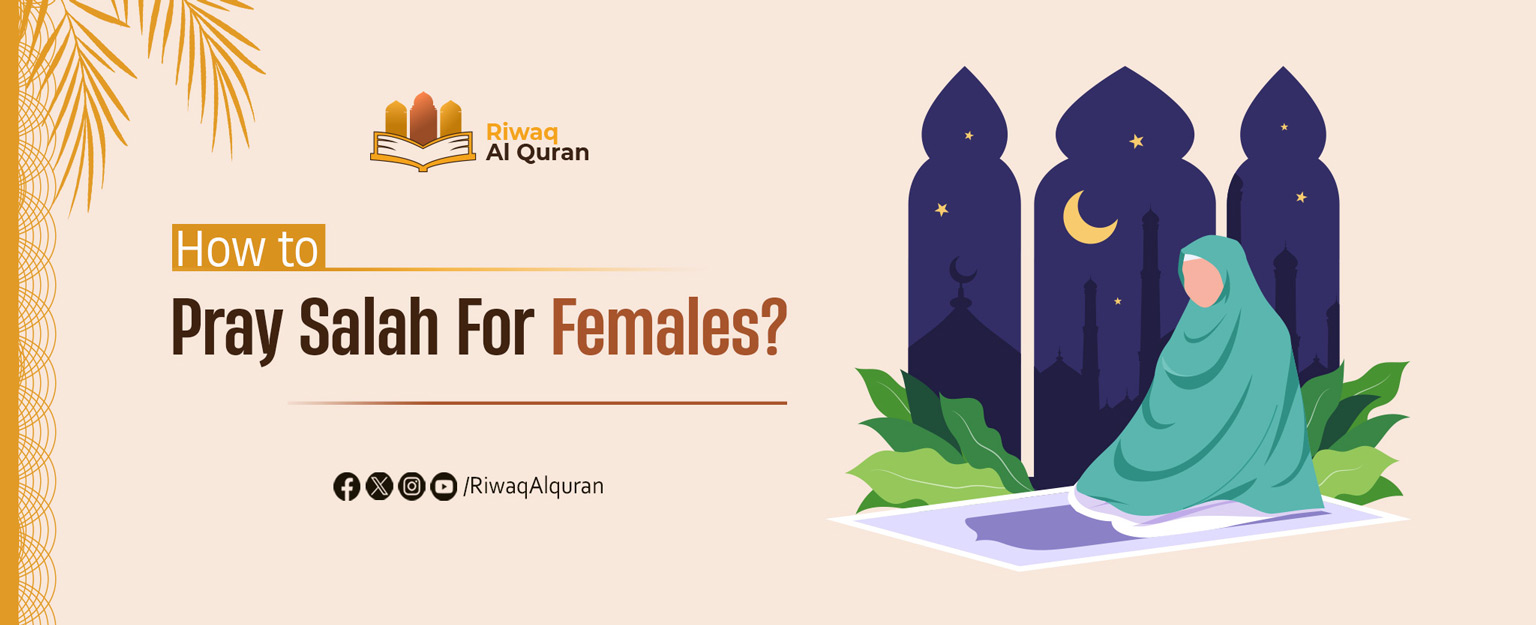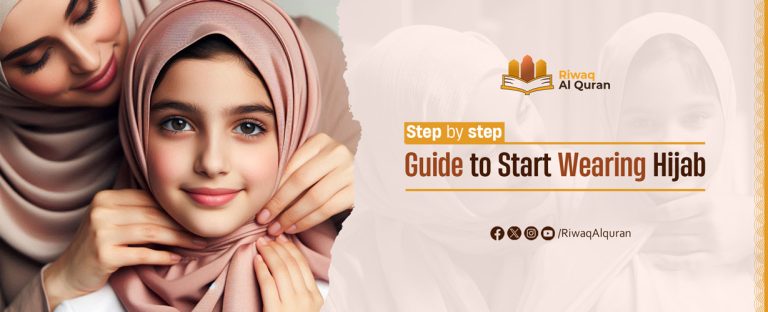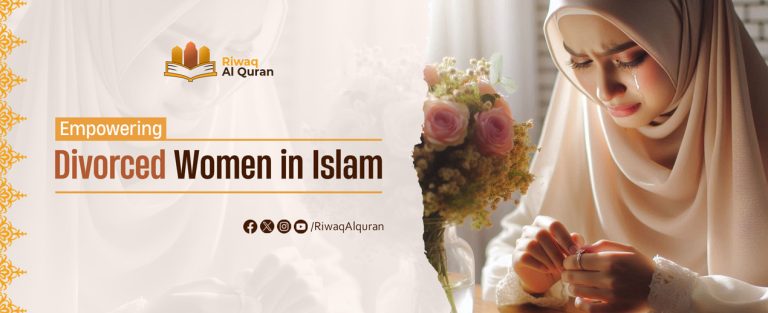To Pray Salah For females, start with wearing modest attire and maintaining focus during prayer. They should follow the steps of Salah diligently, avoiding discouraged actions and ensuring proper hijab. Muslim girls are exempt from Salah during menstruation and after childbirth, without the need to compensate for missed prayers afterward.
Females have a special role in Islam, they are honored, and dignified, by having special rulings catered to their nature.
To know how to pray Salah for females, you need to pay attention to these special differences and apply them accordingly.
Table of Contents
What is Salah?
Salah is the second pillar of Islam and the manifestation of the Islamic faith into action.
Salah is a set of sayings and actions that a Muslim has to perform in a certain manner, as a worship for Allah (God almighty). All details of the Salah prayer are decided by Allah almighty. Muslims worship Allah as Allah wills, not as they want.
Salah is the way to form a strong relationship with Allah almighty, by consistently putting everything behind you and humble yourself before Him.
What is the difference between Salah For Female and For Male?
Praying Salah for females largely follows the same steps as for males, with the primary distinction lying in appropriate attire during prayer. While the details of the prayer remain consistent, females are required to ensure they are properly covered while performing Salah.
Although it’s generally preferred for women to pray at home rather than in the mosque, it’s essential to maintain diligence and not become complacent. Additionally, it’s important to be mindful of acts within Salah that are discouraged, as avoiding these practices contributes to a more devout and focused prayer experience.
Read a full guide on how to pray Salah In Islam.
How To Pray Salah For Females?
For female beginners in Salah, understanding the prayer’s steps and recitations is essential. They should dress modestly, cover their body except for the face and hands, and face the Qiblah. Beginning with Takbir, they recite Al-Fatiha and Quranic verses, move through Rukuh, Sujud, and sitting positions, and conclude with Tashahud. It’s crucial to maintain focus and sincerity throughout the prayer, adhering to the prescribed actions and recitations with humility and devotion.
Here’s a step-by-step guide:
- Dress Appropriately: Wear attire that covers your entire body except for the face and hands. Avoid tight or revealing clothing as it invalidates the prayer.
- Face the Qiblah: Stand facing the direction of the Kaaba or Makkah as best as you can determine.
- Begin with Takbir: Say “Allahu Akbar” to enter Salah while standing.
- Recite Al-Fatiha and Quranic Verses: While standing, recite Al-Fatiha and other Surahs from the Quran.
- Move to Rukuh: Say “Allahu Akbar” and bow down with your back while your hands are on your knees. In Rukuh, say “Subhan Rabia Al-Azim”.
- Return to Standing Position: Rise from Rukuh, saying “Sami’a Allahu liman Hamidah”, and then standing, say “Rabana Wa Laak Alhamd”.
- Proceed to Sujud: Say “Allahu Akbar” and prostrate with your forehead and nose on the ground, palms, knees, and toes also touching the ground. In Sujud, say “Subhan Rabia Al-A’ala”.
- Sit with Knees on the Ground: Say “Allahu Akbar” and sit with your knees on the ground. While sitting, say “Astagfiru Allah”.
- Repeat Sujud: Say “Allahu Akbar” and perform a second Sujud similar to the first one.
- Conclude with Tashahud: Recite the Tashahud, offering greetings, praise, and blessings to Allah and the Prophet Muhammad.
How to finish the Salah?
After Tashahud in the final Rakah, finish Salah by adding the following to Tashahud
(Allahuma Salli Ala muhammadan wa aali Muhammad, kama salita Ala Ibrahim wa aali Ibrahim, Fi Al-aalamin, innaka Hamidun Majid
Alahuma barik ala muhammadan wa aali Muhammad, kama bakrata ala Ibrahim wa aali Ibrahim, fi Al-aalamin innaka Hamidun Majid)
Taslim: Then look to your right and say (Al-Salam Alikum wa Rahmatu Allah) and the same on your left and that’s how you end salah.
The Makruh Acts of Salah
Here are some actions that are “Makruh” (not recommended) in Salah, and better avoided for men and women.
Makruh acts of Salah are many, for Example :
–Turning with the head or eyes (eyes should focus on the ground, near the place of sujud, as a sign of humility)
– Moving, especially unnecessarily, and if it becomes too much it may nullify the Salah!
–Elbows on the ground in sujud
–Elbows touching the legs in Sujud
–To close the eyes in Salah, and it is not from Sunnah or how the prophet peace be upon him used to pray.
–Looking up to the sky in Salah is makruh and the prophet warned from it
Can a woman pray without a Hijab?
No, a Muslim woman can’t pray without a hijab, as that makes the prayer invalid.
While praying Salah, the woman has to cover properly, and only leave her hands and face showing
if the hair is showing, the clothes are tight on the body, or wearing jeans or trousers, that nullifies the prayer.
The prophet peace be upon him said: “Allah is good, and He accepts only what’s good.”
Muslims have to show the utmost respect when praying to Allah almighty.
Respecting Allah’s commands and rulings, especially during Salah, is by obeying His rulings on how to perform Salah, with all its details and actions, including what to wear.
What is the Islamic rule for girls?
Islamic rule for Muslim Girls is that they can pray to Allah (God almighty) as long as they fulfill the conditions of Salah.
A Muslim girl shouldn’t pray or fast while on her period. So, when that hard time comes, Allah makes it easy by lifting this obligation from women, and now she shouldn’t pray instead.
After the monthly period ends, a Muslim girl should compensate for fasting days (from Ramadan) by fasting other days, but she doesn’t need to compensate for prayers.
The Islamic ruling for girls is similar after giving birth as well: the Muslim woman shouldn’t pray or fast. The duration is for forty days or until the bleeding from giving birth stops.
Learn Quran, Arabic And Islamic Studies Online With The Best Native Tutors
Riwaq Al Quran is a comprehensive online platform that offers personalized Quran, Arabic and Islamic Studies Online classes for individuals of all ages and backgrounds.
Their experienced instructors use a structured curriculum to cover Tajweed, Tafsir, and Memorization, providing easy and effective access to learning the Quran.
The advanced online classes allow for seamless communication and interaction between students and teachers. Join Riwaq Al Quran for a deeper connection with the Quran.
We offer several courses such as:
- Online courses for kids.
- Online Quran classes for kids and adults.
- Online Arabic courses
- Online Ijazah courses
- Online Islamic Studies courses.
Here are a sample of our set of Quran Courses that will be helpful for you:
- Online Tafseer Course: Delve into Quranic meanings with our insightful online Tafseer course.
- Noorani Qaida Online: Learn Quranic basics efficiently through our Noorani Qaida online program.
- Online Quran Recitation Course: Enhance Quranic recitation skills through our expert-led online course.
- Online Tajweed Classes: Master Tajweed rules for beautiful Quranic recitation in online classes.
- Quran Memorization Online Course: Memorize the Quran effectively with our specialized online memorization course.
- Online Qirat Course: Explore diverse Qirat styles with our comprehensive online Qirat course.
- Online Quran Classes for Kids: Nurture a love for the Quran in kids through interactive online classes.
Learn how to read the Quran fluently under the guidance of a Native speaker who has memorized the whole Quran.
Start today and one day memorizing the whole Quran will not be a dream but an imminent reality.
Learn how to memorize the Quran now.


Conclusion:
While the steps of Salah remain largely consistent for both genders, females must adhere to appropriate attire during prayer, covering their bodies except for the face and hands.
Although it’s preferable for women to pray at home, diligence is essential, and they should be mindful of discouraged acts within Salah. Maintaining focus and sincerity throughout the prayer is crucial, following each step with humility and devotion.
In Salah, women should wear modest attire and face the Qiblah while beginning with Takbir. Reciting Al-Fatiha and Quranic verses, moving through Rukuh, Sujud, and sitting positions, and concluding with Tashahud are integral steps.
Makruh acts during Salah, such as unnecessary movement or closing the eyes, should be avoided. Moreover, women must adhere to the requirement of wearing a hijab during Salah, as failing to do so invalidates the prayer.
Additionally, Muslim girls have specific rules regarding Salah, including refraining from praying or fasting during menstruation and after childbirth, with no obligation to make up missed prayers afterward.



































